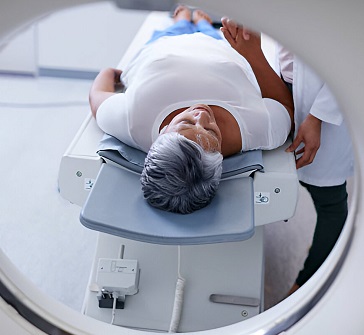 Book Appt.
Book Appt.
 Call Now
Call Now


Ranked as the 23rd most common cancer affecting people across the globe, Gallbladder Cancer is highly aggressive. More than 100,000 people are diagnosed with Gallbladder Cancer every year. Women are 2 to 6 times more likely to develop Gallbladder Cancer as compared to men. Cancer is usually diagnosed in elderlies above 65 years of age, however, it can be seen in younger people as well. The average age of Diagnosis for Gallbladder Cancer is 72.
What is Gallbladder Cancer?
The term Gallbladder Cancer is used for any Cancer that originates within the Gallbladder, a tiny organ that is responsible for storing and concentrating bile juice secreted by the liver. There are several different types of Gallbladder cancer, classified on the basis of the cells involved. Adenocarcinoma is the most common type of Gallbladder cancer, which roughly accounts for 85 percent of the cases.
What are the symptoms of Gallbladder Cancer?
Common symptoms that may point towards the possibility of one having Gallbladder Cancer include:
When should you see a Specialist?
It is advisable to see a specialist as soon as you detect any of the above-mentioned symptoms. All these just point towards the possibility of you having Gallbladder cancer but are not definitive. In order to confirm whether a patient has Gallbladder Cancer or not, doctors perform some physical examinations and tests. The sooner you consult a specialist, your Prognosis would be quicker and you would have a better chance to overcome it.
What causes Gallbladder Cancer?
Gallbladder Cancer is the result of uncontrolled cell multiplication triggered by certain DNA mutations in the cells lining the Gallbladder. There are a number of factors that can increase the risks of such mutations. These include:
Modalities used for the Diagnosis of Gallbladder Cancer
Treatment options available for Gallbladder Cancer
SHALBY Sanar International Hospitals provides extensive medical procedures backed up with our state-of-the-art technology and a team of highly qualified & experienced clinical experts.

Grade 2 Endometrium Cancer | Ms. Robiyakhon | Uzbekistan | Dr. Archit Pandit | SHALBY Sanar

Male Breast Cancer Recovery Story | Dr. Archit Pandit | Cameroon | SHALBY Sanar

Ms. Nafisa’s Inspiring Breast Cancer Recovery | Dr. Archit Pandit | Uzbekistan | SHALBY Sanar International Hospitals

Stage4 colon cancer is curable - Colon cancer with liver metastasis | Kenya | Dr Archit Pandit

Patient from Kenya Treated by Dr. Archit Pandit | SHALBY Sanar International Hospitals

Double Cancer Victory: Mrs. Salma Kapoor's Inspiring Recovery Story | Dr. Archit Pandit

Patient from Uzbekistan Treated by Dr. Archit Pandit | SHALBY Sanar International Hospitals

Patient from Uzbekistan Treated by Dr. Archit Pandit | SHALBY Sanar International Hospitals

Successful Carcinoma Buccal Mucosa Surgery of a Patient from Nigeria by Dr. Archit Pandit

Successful Colon Cancer Surgery of Mr. Faraidun Kaka Bra Amin Amin's from Iraq | Dr Archit Pandit

Miraculous Recovery of a patient from Uzbekistan battling Ovarian Cancer | Dr. Archit Pandit

Successful Cancer Detection & Surgery by Dr. Archit Pandit | SHALBY SHALBY Sanar International Hospitals

Successful Colon Cancer Treatment of a patient from Iraq by Dr Archit Pandit | Surgical Oncology

Successful Glottis Mass & Carcinoma Vocal Cord Treatment of a patient from Iraq by Dr Archit Pandit

Successful Stage 4 Colon Cancer Treatment of a patient from Kenya by Dr Archit Pandit

Surviving the Odds: 56-Year-Old's Journey with Recurrent Carcinoma Vocal Cord | Dr. Archit Pandit

Surviving Recto-Sigmoid Cancer: Mr. Syamand Ahmed's Inspiring Journey

Success Story: Iraqi Patient's Liver Tumour Treatment at SHALBY Sanar International Hospitals

Cytoreductive Surgery Success: Iraqi Patient's 30cm Ovarian Tumor Removed Safely

Beating Liver Cancer: Mr. Abdirashid's Inspiring Story

Ms. Nejood's Success Over Pancreatic Cancer: A Remarkable Journey

Transforming Smiles: Revolutionary Buccal Commando Procedure

Wide Local Excision Surgery & Microvascular Reconstruction of a Cancer patient

Successful Surgery of Esophgeal Cancer

Successful Lung Cancer Surgery of Ms. Jerioth Wanjiru from Kenya

Para Thyroidectomy on Pt Jawad Kadhim Tweli from Iraq

Dr Archit Pandit discusses the fascinating case of Geeta Rani
Our doctors pen down their research findings and experiences from time to time. Their words provide deep insight into the latest techniques, technologies and other advancements in healthcare. It provides expert answers to all kinds of health questions for real-life issues.
VIEW ALL




Since the day of its foundation, SHALBY Sanar International Hospitals is committed to provide comprehensive healthcare services. It regularly organizes awareness programs in its premises and encourages outdoor healthcare activities and camps with an intent to put focus on preventive healthcare.
VIEW ALL